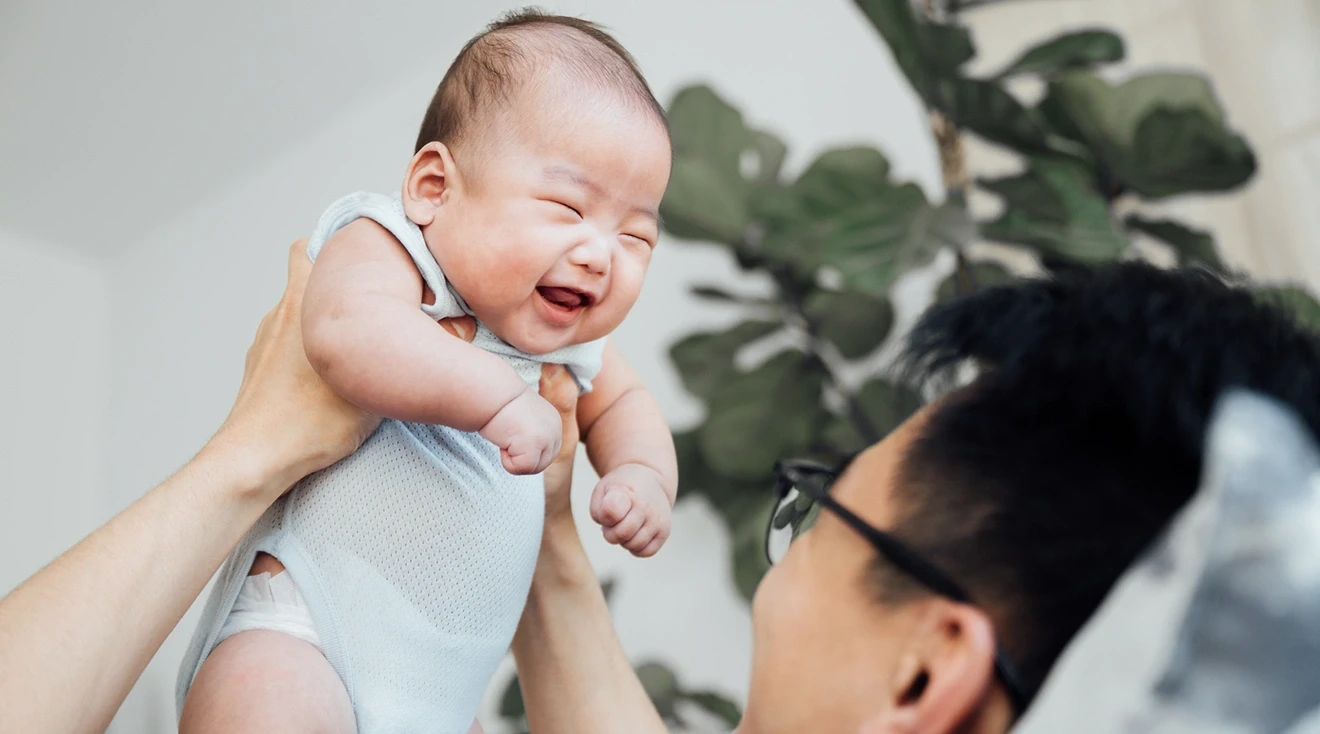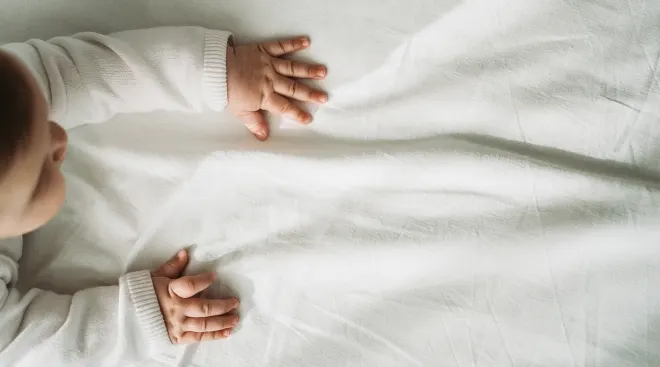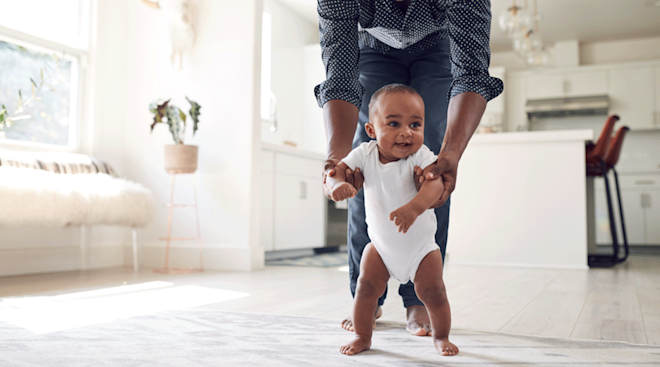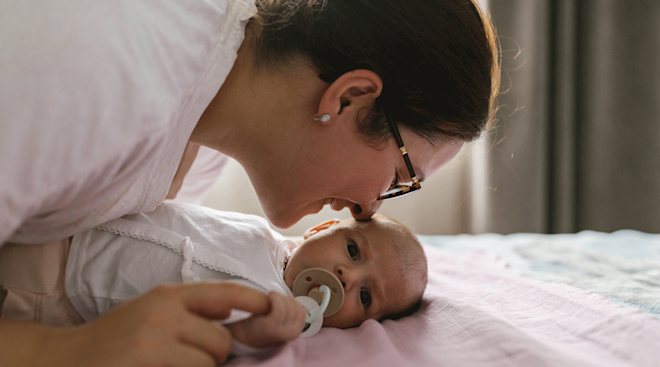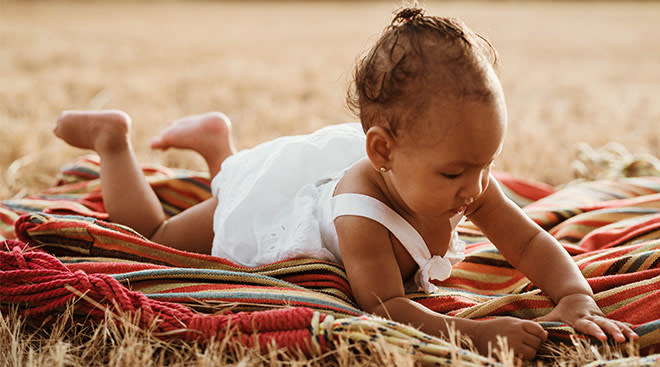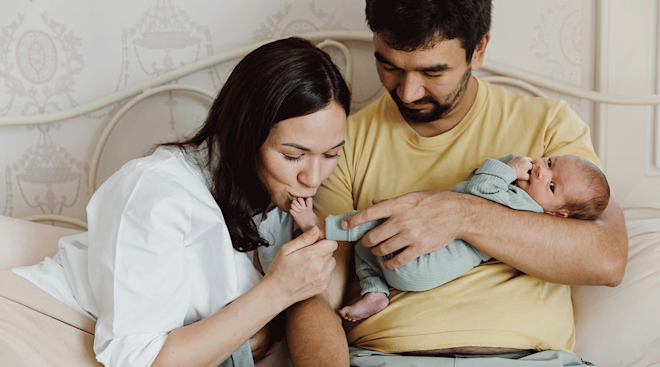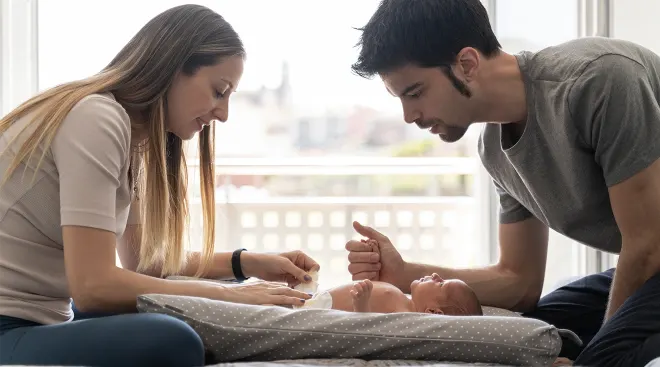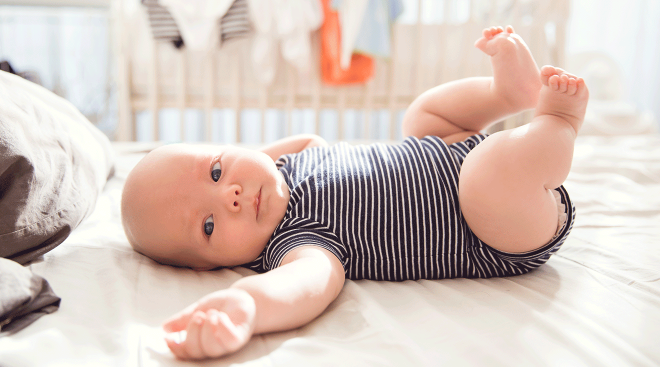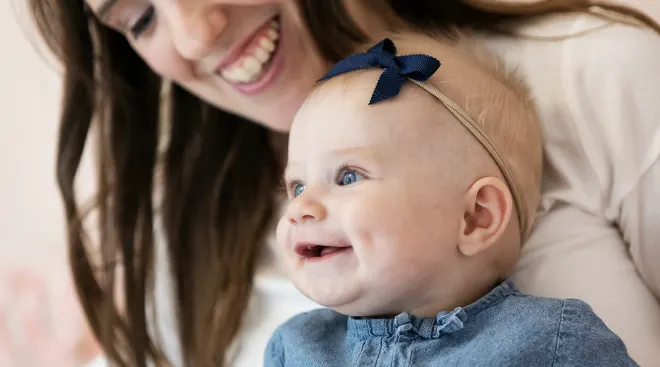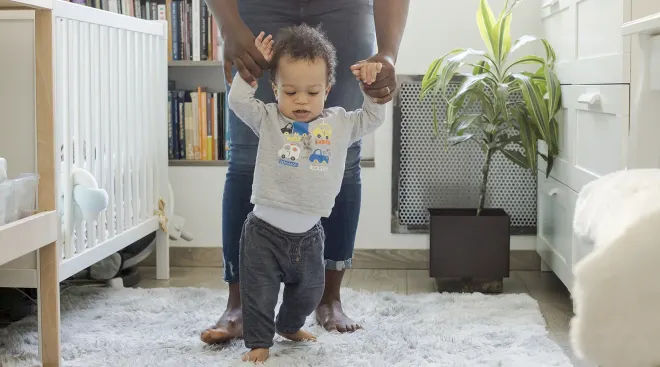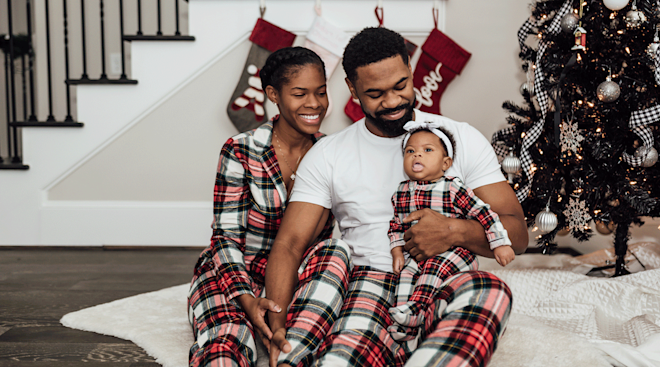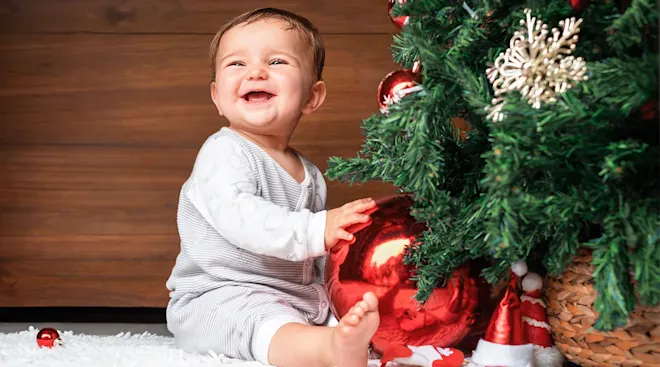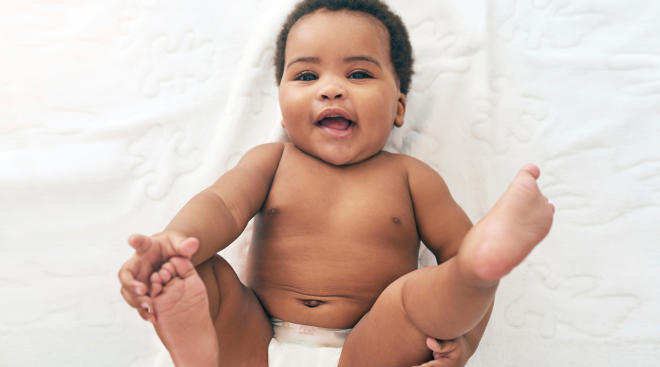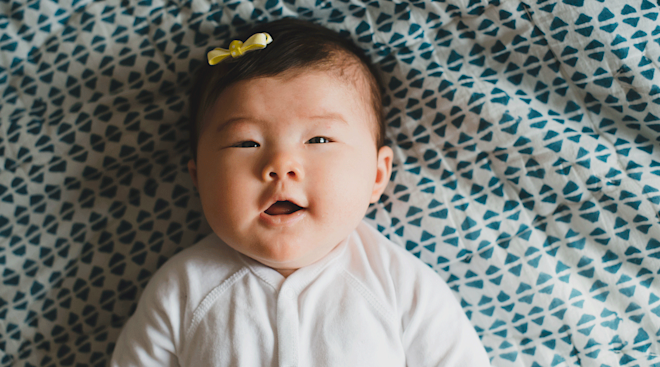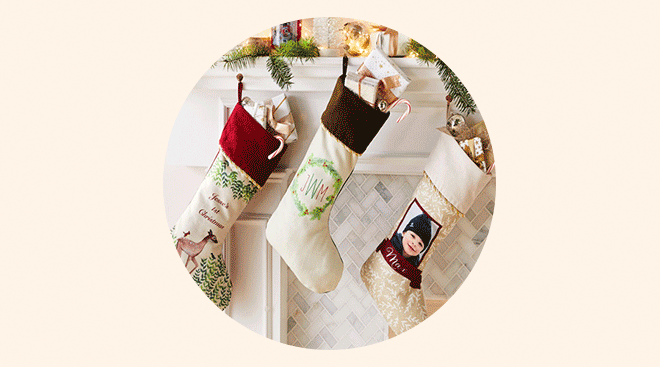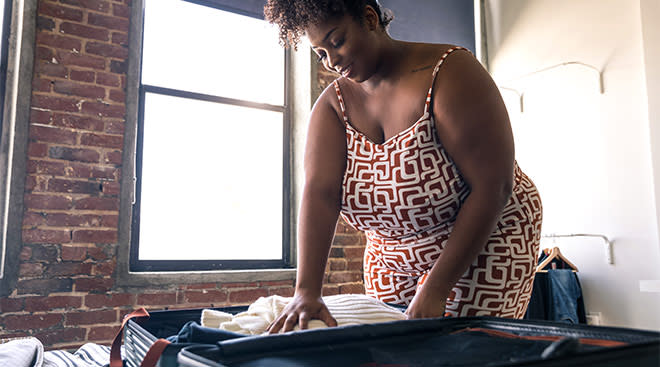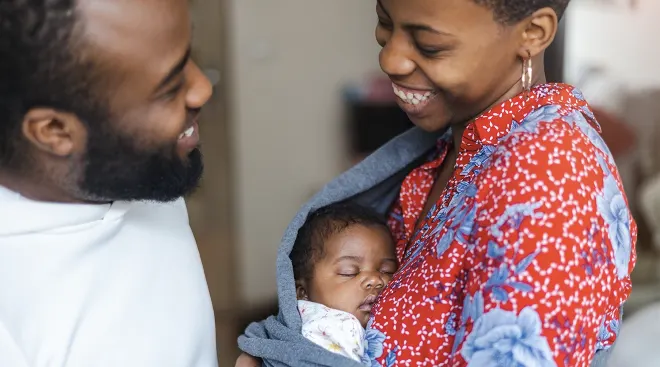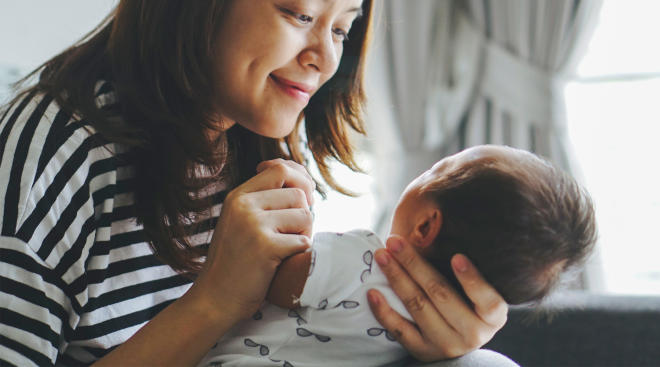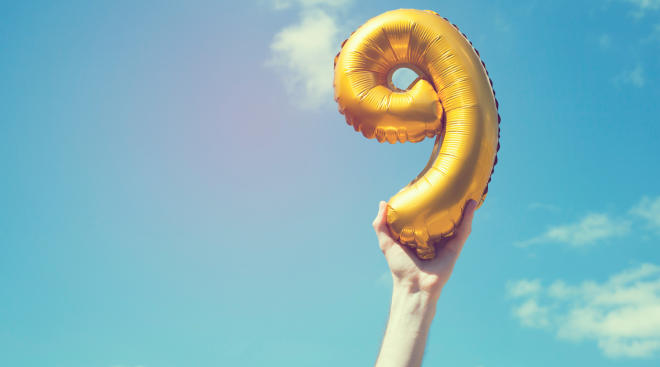When Do Babies Laugh?
If you thought it was exciting to see baby smile, just wait until you hear that sweet first giggle. (It’ll be like music to your ears!) So when do babies start laughing—and what can you do to help elicit that silly sound? Keep reading to get the lowdown on baby’s adorable little laugh, including tips to encourage their amusement.
Before they laugh, baby will experiment with early noises, like cooing and gurgling. It’s your little one’s way of using their voice and trying out different sounds, while also figuring out how to move their mouth and throat, explains Elizabeth Gerosa, MS, CCC-SLP, C/NDT, a speech language pathologist at the Hospital for Special Surgery in New York City. Those cute precursor noises will eventually lead to laughter and talking. But exactly when do babies start to laugh? It typically happens by the time they’re around 4 months old, says Russell Horton, DO, a pediatrician with Banner Ironwood Medical Center in Queen Creek, Arizona.
Is it your comedic chops or something else that makes your sweetheart break into hysterics? Turns out, babies start to laugh for several reasons. While babies are too young to understand humor in the same way that older kids and adults do, seeing a funny face or hearing a silly voice can cause them to giggle. They may also be reacting to something physical (think tickles and raspberry kisses!), says Horton, adding that baby’s responses will “become stronger as they get older and get more practice laughing and making sounds.”
Baby may also start to laugh to gauge your reaction. Sound plays a key role here, as baby’s eyesight can take many months to fully develop. (Bonus: These early interactions between you and baby lay the foundation for their social development, Horton says.)
What’s more, babies don’t exclusively laugh when they’re awake. Don’t be surprised if you hear a few little laughs coming from the baby monitor after you put your child down for a nap or bedtime. Babies start to laugh in their sleep for the first time around 9 months (or possibly earlier), says Stanley Spinner, MD, chief medical officer of Texas Children’s Pediatrics in Houston. There’s really no way of knowing why babies laugh in their sleep, but experts believe it happens most often during REM and active parts of sleep. During this stage, babies “will produce some involuntary movements, coos, giggles and laughs,” Horton says.
Baby laughs reflexively early on. But their laughter becomes more intentional, as they develop and begin to understand more of what’s happening around them. Around the 12-month mark, babies also grasp object permanence (that things still exist even when you can’t see them). This increased understanding can also result in more laughter. Games like peek-a-boo may set off giggles, as well as surprise actions, like repeatedly stacking blocks and then knocking them down. (Since baby now understands those blocks are supposed to be stacked, they’ll find it hilarious to see them fall down.) “As they get older, they develop a sense of what’s meant to be funny,” Horton says.
But not everyone will be able to get baby to laugh out loud. “As babies get closer to 12 months, they start to differentiate between familiar and unfamiliar people, and can develop stranger anxiety,” Spinner says. So if you make baby laugh but a friendly stranger makes them cry, it’s totally normal, and you’ll know why.
Baby’s voice will also change over time, as the larynx develops, adds Gerosa. “It’ll drop and change in intensity, tone and pitch.”
Eager to hear that sweet little laugh? There are tons of ways to get baby to giggle. “Let [your] inhibitions go, and have fun,” suggests Horton. Below, expert tips on making baby laugh:
-
Use physical play: To tickle baby’s funny bone, try gently tickling their toes, blowing raspberries, giving kisses, gently bouncing them up and down on your lap or playing a game of pat-a-cake.
-
Make silly sounds and funny faces: These classics are foolproof ways to set off hysterics. “The more vocal and visual interaction you can provide, the better,” Spinner says. Try to exaggerate movements and perform your playtime antics over and over to make baby laugh.
-
Make sure baby’s content: “A fed, changed and content baby is most ripe for laughter,” Horton says. Just like adults, if baby is overstimulated, hungry or tired, odds are they’ll be too cranky to laugh.
Despite all your attempts, if baby still doesn’t laugh, don’t feel bad! “Sometimes, like [adults], they just aren’t in the mood, Horton says—and that’s okay! Give it some time before you try again.
If baby doesn’t laugh by 6 months, Horton recommends flagging it to your pediatrician. “There may be nothing wrong, but it helps with future monitoring and early intervention, if needed,” he says. Some parents may worry about autism, but keep in mind that it’s not something diagnosed in infancy. Plus, it may not be the reason baby isn’t laughing. According to Spinner, not laughing before age one isn’t necessarily a concern, as long as baby is cooing, smiling and generally interacting in a social way with others. Babies develop at their own pace, and it’s perfectly normal for some to laugh later. Plus, some babies are naturally more serious than others and laugh a little less. That said, if you have any concerns, don’t hesitate to bring them up with your pediatrician.
Please note: The Bump and the materials and information it contains are not intended to, and do not constitute, medical or other health advice or diagnosis and should not be used as such. You should always consult with a qualified physician or health professional about your specific circumstances.
Plus, more from The Bump:
Stanley Spinner, MD, is a pediatrician and chief medical officer of Texas Children’s Pediatrics in Houston. He earned his medical degree at University of Texas Southwestern Medical School and completed his residency at Baylor College of Medicine.
Russell Horton, DO, is a pediatrician with Banner Ironwood Medical Center in Queen Creek, Arizona. He earned his medical degree from Arizona College of Osteopathic Medicine of Midwestern University.
Elizabeth Gerosa, MS, CCC-SLP, C/NDT, is a speech language pathologist at the Hospital for Special Surgery in New York City.
Learn how we ensure the accuracy of our content through our editorial and medical review process.
Navigate forward to interact with the calendar and select a date. Press the question mark key to get the keyboard shortcuts for changing dates.
































